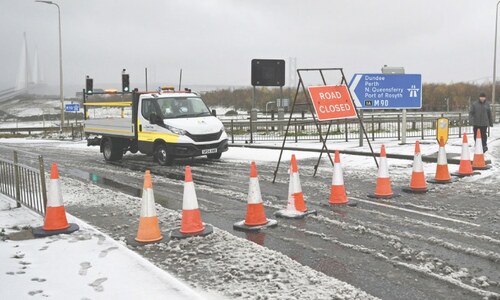Musharraf says he invoked emergency after consulting Gen Kayani
ISLAMABAD: Former president retired Gen Pervez Musharraf has claimed that he invoked the Nov 3, 2007 emergency after holding consultations with former chief of army staff retired Gen Ashfaq Parvez Kayani and the senior civilian and military hierarchy.
This is the first time that Gen Musharraf has directly dragged Gen Kayani into the emergency issue since the PML-N government had filed a (high treason) complaint against him in a special court in December 2013.
In a statement recorded before the joint investigation team (JIT) of the Federal Investigation Agency, the former military ruler termed the former army chief “principal offender” in the case.
Know more: FIA seeks emergency record from ministries, GHQ
He said Gen Kayani became the chief of army staff on Nov 27, 2007, but he did not revoke the emergency. “By not revoking the same, Gen Kayani is also a principal offender,” he alleged.
The former military ruler insisted that in addition to Gen Kayani he had consulted the senior military and civilian leadership, including the then prime minister Shaukat Aziz, before imposing the emergency.
Gen Musharraf alleged that “Aziz, the then law minister Zahid Hamid, who is a member of the cabinet in the present government, Justice Abdul Hameed Dogar and all the judges who had taken oath under the PCO, all senior members of the armed forces in particular General Kayani, all chief ministers, all governors, all members of the federal and provincial cabinets, all members of the federal and provincial legislative assemblies, all senior federal and provincial bureaucrats are principal offenders or aiders, abettors, collaborators and facilitators”.
The former dictator disclosed that he proclaimed the emergency on the advice of the then prime minister Aziz but its summary had ‘mysteriously’ been removed from the official record by some ‘quarters concerned’.
“After my exit from the Presidency in 2008, intentionally some vested quarters removed the said summary of Nov 3, 2007 emergency from the record.” According to the statement, the summary was made public in 2013 through social media.
Gen Musharraf asserted that on March 9, 2007, when he suspended the then Chief Justice Iftikhar Mohammad Chaudhry after sending a reference against him to the Supreme Judicial Council, the latter himself insisted to meet him as he was “frequent visitor and used to meet me (Gen Musharraf), all upon his choice and insistence”.
He alleged that Justice Chaudhry “in the name of judicial activism blatantly interfered with the matters of the executive and the legislature. Chief Justice Iftikhar Chaudhry had become singularly vindictive against myself after the events of March 9, 2007 when he had to face a reference before the Supreme Judicial Council that included allegations against him and his son but it was never adjudicated upon”.
Gen Musharraf claimed that he accepted the restoration of Justice Chaudhry by the Supreme Court “in good faith” but the situation became worse afterwards.
He said that at that time “unfortunately, some 61 terrorists were released in view of a court verdict, and these terrorists took refuge in Karachi, Rawalpindi, Sargodha, KP and Balochistan”, adding that “at many places the extremists and their relatives were challenging the writ of the government, brazenly fighting against the law-enforcement agencies”.
“The then premier Aziz on Nov 3, 2007, through a letter captioned ‘national security situation’, apprised the magnitude of extremism, militancy and terrorism, which were going on in the country and the widespread perception of overstepping the limits of the judiciary”.
Gen Musharraf claimed that Mr Aziz wanted imposition of emergency through the above mentioned letter, but “I plainly declined to do so and maintained that I could only act upon the advice of the then Prime Minister Shaukat Aziz if he were to properly send me a summary in term of the Rules of Business. As a sequel to his letter dated November 3, 2007, Prime Minister Shaukat Aziz sent me a summary directly by hand, through his staff, which was received by me (Gen Musharraf) in the President House”.
Gen Musharraf never denied having imposed emergency and insisted that he did so with the prior consultation of prime minister, chairman joint chiefs of staff committee, services chiefs, corps commanders, the then vice chief of army staff, governors and others. But in his defence he pointed out that he had held the constitution in abeyance and did not subvert it. He suggested to the investigation team that “the above-mentioned persons can be approached as they can easily be identified, adding that these officials never denied or clarified that they were not consulted on the issue of imposition of emergency”.
According to the statement, “Article 6 of the Constitution was amended in the year 2010 vide the Eighteenth Amendment. The words and phrase ‘suspends’ and ‘holds in abeyance’ were added for the first time in this article by the Eighteenth Amendment” and it could not apply to the proclamation which he had issued in 2007.
The former military chief said he had told the JIT that “no case is made out against me as I acted upon the advice of the then Prime Minister Shaukat Aziz and his cabinet in imposing the emergency”.
Published in Dawn, December 23rd, 2015














































